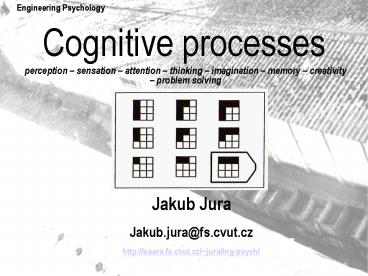Cognitive processes - PowerPoint PPT Presentation
Title: Cognitive processes
1
Cognitive processes
Engineering Psychology
- perception sensation attention thinking
imagination memory creativity problem
solving
Jakub Jura Jakub.jura_at_fs.cvut.cz http//users.fs.c
vut.cz/jura/ing-psych/
2
What is Cognitive?
- From latin cognoscere getting to know
- Distinguish emotional and rational
- Descartes Cogito ergo sum.
Mental processes mediate between stimulus and
response.
3
Cognitive processes
- Base Cognitive processes
- Perception
- Sensation
- Attention
- Thinking
- Imagination
- Memory
- Advanced Cognitive processes
- Creativity
- Problem solving
4
Sensation
- Sensation is about sense organ and basic
processes on this level. - Perception is about creating whole percept.
5
Sensation
Perception Percept Sence Organ
Visual Perception Image Eye
Auditive Perception Sound Ear
Gustatory Perception Taste Taste Buds
Olfactory Perception Smell Nose
Haptic Perception Touch on skin Nociceptors
Proprioception Body position Proprioceptor
Human Feromon Affection / antipathy Vomero-Nasal Organ
Magnetoception Impression of north Unknown
6
Sensation Delusions
Lateral Inhibition Efect
- Machs Strips
7
Negative afterimage
8
Perception
- Perception is perception of diference.
- Sensuals limits
- WeberFechner law
- Gestalt law
- Multistable figures
- Invariance in perception
9
WeberFechner Law
- Psychophysics
- Ernest Heinrich Weber (17951878)
- Gustav Theodor Fechner (18011887)
- Stimulus ? Percept
- Stimulus ? Sensation ? Percept
10
Experiment 1
- Dependence of sense impression on the intensity
of stimulus
- Sound
- Light
- Procedure
- Set intensity to basic level (L)
- Increase intensity up to one degree (L1)
- Remember this degree and set intensity up to L2,
L3, Ln
Impresion
Sensum
11
WeberFechner Law
- dP k dS/S,
- P k ln (S/S0)
- ?P k (?S/S)
- P percept
- k constant
- S stimulus
- S0 lower possible stimulus
12
Perception Delusionss
Which of these circles is bigger?
13
Perception Delusionss
- Effect of Contrast
Lighter
Darker
14
Perception Delusionss
15
(No Transcript)
16
Is anything here?
17
Gestalt Laws
- Proximity
- We tend to group nearby objects.
- Similarity
- We tend to group objects with similar properties
- Closure
- We are so accustomed to seeing closure that we
sometimes close things that aren't.
18
Gestalt Laws
- Good Continuation
- We tend to assign objects to an entity that is
defined by smooth lines or curves - Pregnantz
- We tend to good shape
19
Experiment 2
20
Multistable perception
- Mind separate figure and backgroun.
- Unstably between two or more alternative
interpretations. - Since you see both, you cant see both.
- Changing may be under control only partially.
21
Invariance in perception
- Objects are recognized independent of rotation,
translation, scale, elastic deformations,
different lighting, and different component
features.
22
Neisser's cycle of perceptionCognitive Ecology
Actual world
Object available information
Samples
Modify
Schema of environment
Exploration
Locomotion and action
Cognitive map
Directs
23
Memory
- Sensory memory
- George Sperling
- (200 500 ms)
- Short-term memory
- George Miller
- 72 chunks
- Chunking process (recoding)
- Long-term memory
- Hippocampus
- Memory processes
- Imprint
- Retent
- Remember
- Recognise
24
Ebbinghaus experiments
1 2 3 4 5 6 7 8
- Co
- Se
- Zu
- Ny
- Pa
- Dy
- Ro
- Ke
- Ty
- Wa
- Next
- Co
- Se
- Zu
- Ny
- Pa
- Dy
- Ro
- Ke
- Ty
- Wa
- Next
- Co
- Se
- Zu
- Ny
- Pa
- Dy
- Ro
- Ke
- Ty
- Wa
- Next
- Co
- Se
- Zu
- Ny
- Pa
- Dy
- Ro
- Ke
- Ty
- Wa
- Next
- Co
- Se
- Zu
- Ny
- Pa
- Dy
- Ro
- Ke
- Ty
- Wa
- Next
- Co
- Se
- Zu
- Ny
- Pa
- Dy
- Ro
- Ke
- Ty
- Wa
- Next
- Co
- Se
- Zu
- Ny
- Pa
- Dy
- Ro
- Ke
- Ty
- Wa
- Next
- Co
- Se
- Zu
- Ny
- Pa
- Dy
- Ro
- Ke
- Ty
- Wa
- Next
25
Ebbinghaus Forgetting Curve
- R e-t/s
- R memory retention
- s relative strenght of memory
- t time
45
35
26
Serial-positioning effect
- Which of the syllable you remember easily?
- Initialy
- Final
- Out of serial-positioning effect
- Meaningfull
- Related to myself
- Connected to my activity
27
Memory test
- How big is capacity of you visual memory?
Redraw this figure maximaly precisely
28
Imaging
- Constructive and Reconstructive processes and
eyes movement.
- Imagine yellow elephant with red dots.
- Imagine what did you eat last evening.
29
Experiment 3 - Mental rotation
F
- How many times you need to read rotated sign.
Angle
Time 1 s
Time 2
R
B
A
M
L
Q
T
30
Completing square test
11
18
31
Attention
- Orientation reflex
- Orientation activities
- Bourdon test
- d2 test
32
Thinking
- J. P. Guilford
- Convergent production - generation of logical
conclusions from given information, where
emphasis is upon achieving unique or
conventionally best outcomes. It is likely that
given (cue) information fully determines the
outcome as in mathematics and logic. - Divergent production - generation of logical
alternatives from given information, where
emphasis is upon variety, quantity, and relevance
of output from the same source.
33
Problem Solving
- http//www.studygs.net/problem/index.htm
34
- Interconect all of this 9 point by the 4 segments
of a line non-stop.
35
Creativity
- Preparation
- Incubation
- Insight
- Evaluation
- Elaboration
36
E. Rossi creative phase
37
Metacognition
- Thinking about thinking (exactly cognition about
cognition) - First-level metacognition
- Second-level metacognition































